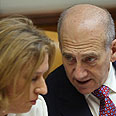

PM promises to freeze settlements, remove outposts
Road Map includes explicit commitments and we will have to implement them, Olmert explains during weekly cabinet meeting. Government approves release of 441 prisoners as goodwill gesture to Palestinian president; Shas, Yisrael Beitienu ministers oppose move
"The Road Map includes explicit commitments by Israel not to build new settlements and new communities in the Judea and Samaria, and not to expropriate lands in the Judea and Samaria area. We will have to implement these commitments," Olmert said during the weekly cabinet meeting.
During the meeting, the government approved the release of 441 Palestinian prisoners according to a proposal presented by Olmert as a goodwill gesture aimed at bolstering the Palestinian prisoners. Three Shas ministers, two Yisrael Beiteinu ministers and Transportation Minister Shaul Mofaz (Kadima) voted against the move.
Sources at the Prime Minister's Office said that the release would not harm the efforts to free kidnapped soldier Gilad Shalit, as these were not prisoners demanded by Hamas.
Sixteen of the prisoners expected to be released are Fatah members from the Gaza Strip. "This is aimed at signaling to Hamas that achievements can be reached only through negotiations," a source at the Prime Minister's Office said.
A ministerial committee for the release of prisoners will discuss the list of prisoners on Wednesday and will decide on the date of the release. Some of the prisoners have to be pardoned by President Shimon Peres and the command chief.
According to the prime minister, "We must not reiterate that the Road Map is a strategic asset for Israel and simultaneously ignore our commitments."
Olmert said that the government had to make some difficult decisions, but added that they would only be implemented after the negotiations "and parallel to the Palestinians' implementation of their war on terror."
"Let's admit, we committed in the Road Map not to build new communities – and we won't. We committed not to expropriate lands – and we won't. We promised to remove the illegal outposts, and we will remove them.
"We shall not deviate from our principles and we shall fulfill our commitments. There will be no new communities and no expropriation of lands," he said.
'Israel not dragged into process'
The prime minister explained to the ministers that Israel was not being dragged into the process.
"No one is forcing us. We are coming to Annapolis out of our free will in order to create a development that will lead to an agreement within a short period of time. I don’t think time is on our side. On the contrary, the current negotiations have a better chance than any future negotiations."
During the cabinet meeting, Infrastructure Minister Binyamin Ben-Eliezer presented his diplomatic plan for the day after the Annapolis peace conference.
Ben-Eliezer stated that "the border will be determined according to UN Resolutions 242 and 338 and (US President George W.) Bush's letter on border amendments and territory exchanges."
The minister stressed that "Jerusalem will be Israel's capital according to the principle of Jewish neighborhoods for the Jews and Arab neighborhoods to the Arabs. There will be no right of return for Palestinian refugees, but they will receive financial compensation through international efforts, as will Jews who left Arab countries. The safe crossing between the Judea and Samaria and Gaza will be under Israeli sovereignty."
Alongside intensive meetings between the Israeli and Palestinian negotiation teams in a bid to draft a joint statement for the peace conference, Olmert is expected to meet with Palestinian President Mahmoud Abbas on Monday afternoon. On Tuesday, he is scheduled to meet with Egyptian President Hosni Mubarak in Sharm el-Sheikh.
Diplomatic sources estimated that Mubarak would be able to convince the Saudis and the Syrians to take part in the Annapolis summit during a meeting with Arab League representatives in Cairo over the coming weekend.















